| Listing 1 - 10 of 63 | << page >> |
Sort by
|
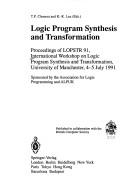
ISBN: 0387197427 3540197427 144713494X 9783540197423 Year: 1992 Publisher: Berlin Springer
Abstract | Keywords | Export | Availability | Bookmark
 Loading...
Loading...Choose an application
- Reference Manager
- EndNote
- RefWorks (Direct export to RefWorks)
Logic programming --- -681.3*I22 --- Computer programming --- Congresses --- Automatic programming: automatic analysis of algorithms; program modification; program synthesis; program transformation; program verification (Artificialintelligence)--See also {681.3*D12}; {681.3*F31} --- Congresses. --- 681.3*I22 Automatic programming: automatic analysis of algorithms; program modification; program synthesis; program transformation; program verification (Artificialintelligence)--See also {681.3*D12}; {681.3*F31} --- 681.3*I22 --- Logic programming - Congresses
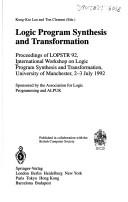
ISBN: 3540198067 9783540198062 Year: 1993 Publisher: Berlin Springer
Abstract | Keywords | Export | Availability | Bookmark
 Loading...
Loading...Choose an application
- Reference Manager
- EndNote
- RefWorks (Direct export to RefWorks)
Logic programming --- 681.3*I22 --- 681.3*I22 Automatic programming: automatic analysis of algorithms; program modification; program synthesis; program transformation; program verification (Artificialintelligence)--See also {681.3*D12}; {681.3*F31} --- Automatic programming: automatic analysis of algorithms; program modification; program synthesis; program transformation; program verification (Artificialintelligence)--See also {681.3*D12}; {681.3*F31} --- Congresses --- Programming --- Logic programming - Congresses
Book
ISBN: 2225804710 9782225804717 Year: 1984 Publisher: Paris Masson
Abstract | Keywords | Export | Availability | Bookmark
 Loading...
Loading...Choose an application
- Reference Manager
- EndNote
- RefWorks (Direct export to RefWorks)
681.3*I22 --- 681.3*I22 Automatic programming: automatic analysis of algorithms; program modification; program synthesis; program transformation; program verification (Artificialintelligence)--See also {681.3*D12}; {681.3*F31} --- Automatic programming: automatic analysis of algorithms; program modification; program synthesis; program transformation; program verification (Artificialintelligence)--See also {681.3*D12}; {681.3*F31} --- Programmation (Informatique) --- Intelligence artificielle
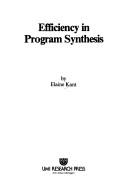
ISBN: 083571215X 9780835712156 Year: 1981 Volume: 8 Publisher: Ann Arbor, Michigan : UMI Research Press,
Abstract | Keywords | Export | Availability | Bookmark
 Loading...
Loading...Choose an application
- Reference Manager
- EndNote
- RefWorks (Direct export to RefWorks)
Computer programming --- #TCPW P7.2 --- #TCPW P7.6 --- #TCPW P6.3 --- 681.3*A0 --- 681.3*I22 --- 681.3*I22 Automatic programming: automatic analysis of algorithms program modification program synthesis program transformation program verification (Artificialintelligence)--See also {681.3*D12} {681.3*F31} --- Automatic programming: automatic analysis of algorithms program modification program synthesis program transformation program verification (Artificialintelligence)--See also {681.3*D12} {681.3*F31} --- 681.3*A0 General --- General --- Computers --- Electronic computer programming --- Electronic data processing --- Electronic digital computers --- Programming (Electronic computers) --- Coding theory --- Programming --- 681.3*I22 Automatic programming: automatic analysis of algorithms; program modification; program synthesis; program transformation; program verification (Artificialintelligence)--See also {681.3*D12}; {681.3*F31} --- Automatic programming: automatic analysis of algorithms; program modification; program synthesis; program transformation; program verification (Artificialintelligence)--See also {681.3*D12}; {681.3*F31} --- Automatic Programming --- Program Synthesis --- Efficiency --- Computer programming. --- Programmation (informatique)
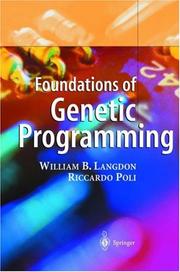
ISBN: 3540424512 9783540424512 Year: 2002 Publisher: Berlin : Springer,
Abstract | Keywords | Export | Availability | Bookmark
 Loading...
Loading...Choose an application
- Reference Manager
- EndNote
- RefWorks (Direct export to RefWorks)
Genetic programming (Computer science) --- 681.3*I22 --- 681.3*I22 Automatic programming: automatic analysis of algorithms program modification program synthesis program transformation program verification (Artificialintelligence)--See also {681.3*D12} {681.3*F31} --- Automatic programming: automatic analysis of algorithms program modification program synthesis program transformation program verification (Artificialintelligence)--See also {681.3*D12} {681.3*F31} --- Computer programming --- Genetic algorithms --- Automatic programming: automatic analysis of algorithms; program modification; program synthesis; program transformation; program verification (Artificialintelligence)--See also {681.3*D12}; {681.3*F31} --- 681.3*I22 Automatic programming: automatic analysis of algorithms; program modification; program synthesis; program transformation; program verification (Artificialintelligence)--See also {681.3*D12}; {681.3*F31} --- Artificial intelligence. Robotics. Simulation. Graphics --- Genetic programming (Computer science).

ISBN: 9027715041 9400970218 9400970196 Year: 1983 Volume: vol 95 Publisher: Dordrecht : D. Reidel,
Abstract | Keywords | Export | Availability | Bookmark
 Loading...
Loading...Choose an application
- Reference Manager
- EndNote
- RefWorks (Direct export to RefWorks)
Programming --- Computer programming --- -681.3*A0 --- 681.3*I22 --- Computers --- Electronic computer programming --- Electronic data processing --- Electronic digital computers --- Programming (Electronic computers) --- Coding theory --- Congresses --- General --- Automatic programming: automatic analysis of algorithms; program modification; program synthesis; program transformation; program verification (Artificialintelligence)--See also {681.3*D12}; {681.3*F31} --- 681.3*I22 Automatic programming: automatic analysis of algorithms; program modification; program synthesis; program transformation; program verification (Artificialintelligence)--See also {681.3*D12}; {681.3*F31} --- 681.3*A0 General --- 681.3*A0 --- Electronic digital computers programming --- Computer programming.
Book
ISBN: 3540525890 3642615120 3540523561 0387523561 9783540523567 9783540525899 Year: 1990 Publisher: Berlin Springer
Abstract | Keywords | Export | Availability | Bookmark
 Loading...
Loading...Choose an application
- Reference Manager
- EndNote
- RefWorks (Direct export to RefWorks)
Programming --- Computer software --- Computer programs --- Development. --- Specifications. --- 681.3*D2 --- 681.3*I22 --- 681.3*I22 Automatic programming: automatic analysis of algorithms; program modification; program synthesis; program transformation; program verification (Artificialintelligence)--See also {681.3*D12}; {681.3*F31} --- Automatic programming: automatic analysis of algorithms; program modification; program synthesis; program transformation; program verification (Artificialintelligence)--See also {681.3*D12}; {681.3*F31} --- 681.3*D2 Software engineering: protection mechanisms; standards--See also {681.3*K63}; {681.3*K51} --- Software engineering: protection mechanisms; standards--See also {681.3*K63}; {681.3*K51} --- Computer software - Development. --- Computer programs - Specifications.
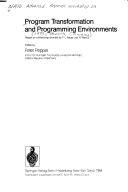
ISBN: 3540129324 0387129324 3642464920 3642464904 9780387129327 9783540129325 Year: 1984 Volume: 8 Publisher: Berlin : Springer-Verl.,
Abstract | Keywords | Export | Availability | Bookmark
 Loading...
Loading...Choose an application
- Reference Manager
- EndNote
- RefWorks (Direct export to RefWorks)
Programming --- Computer programming management --- Computerprogrammering -- Beheer --- Programmation des ordinateurs -- Gestion --- 681.3*D26 --- 681.3*I22 --- Programming environments: interactive (Software engineering) --- Automatic programming: automatic analysis of algorithms; program modification; program synthesis; program transformation; program verification (Artificialintelligence)--See also {681.3*D12}; {681.3*F31} --- 681.3*I22 Automatic programming: automatic analysis of algorithms; program modification; program synthesis; program transformation; program verification (Artificialintelligence)--See also {681.3*D12}; {681.3*F31} --- 681.3*D26 Programming environments: interactive (Software engineering) --- Electronic digital computers --- Congresses --- Electronic digital computers.
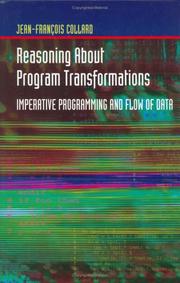
ISBN: 0387953914 9780387953915 9780387224619 9786610009534 1280009535 0387224610 Year: 2003 Publisher: New York, New York : Springer,
Abstract | Keywords | Export | Availability | Bookmark
 Loading...
Loading...Choose an application
- Reference Manager
- EndNote
- RefWorks (Direct export to RefWorks)
Overview The motivation of this text lies in what we believe is the inadequacy of current frameworks to reason about the ?ow of data in imperative programs. This inadequacy clearly shows up when dealing with the individual side effects of loop iterations. - deed, we face a paradoxical situation where, on the one hand, a typical program spends most of its execution time iterating or recursing on a few lines of codes, and, on the other hand, current optimization frameworks are clumsy when trying to capture the effects of each incarnation of these few lines—frameworks we inherited from designs made decades ago. The reasons are manyfold, but one of them stands out: The same concepts have been used, on the one hand, to represent and manipulate programs internally in compilers and, on the other hand, to allow us humans to reason about optimizations. Unfortunately, these two uses have different aims and constraints. An example of such a situation is given by control-?ow graphs of basic blocks, which have been - tremely useful in practice as an internal representation of programs, but which are not always adequate or convenient to formally think about programs and specify their transformations. In some cases, de?nitions based on control-?ow graphs can be overly restrictive. Dominance, studied in Chapter 4, is a good example.
Programming --- Programming languages (Electronic computers) --- Langages de programmation --- 681.3*I22 --- Computer languages --- Computer program languages --- Computer programming languages --- Machine language --- Electronic data processing --- Languages, Artificial --- Automatic programming: automatic analysis of algorithms; program modification; program synthesis; program transformation; program verification (Artificialintelligence)--See also {681.3*D12}; {681.3*F31} --- Programming languages (Electronic computers). --- Computer Science --- Engineering & Applied Sciences --- 681.3*I22 Automatic programming: automatic analysis of algorithms; program modification; program synthesis; program transformation; program verification (Artificialintelligence)--See also {681.3*D12}; {681.3*F31} --- Computer science. --- Computer programming. --- Computer Science. --- Programming Languages, Compilers, Interpreters. --- Programming Techniques. --- Computers --- Electronic computer programming --- Electronic digital computers --- Programming (Electronic computers) --- Coding theory
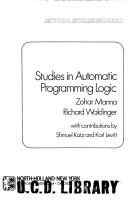
ISBN: 0444002243 9780444002242 Year: 1977 Publisher: New York, NY : Elsevier North-Holland,
Abstract | Keywords | Export | Availability | Bookmark
 Loading...
Loading...Choose an application
- Reference Manager
- EndNote
- RefWorks (Direct export to RefWorks)
Programming --- Automatic programming (Computer science) --- Computer programs --- 519.68 --- 681.3 --- 681.3*I22 --- Computer program files --- Files, Computer program --- Program files, Computer --- Programs, Computer --- Computer files --- Computer software --- Automatic program construction (Computer science) --- Computer programming --- Automatic programming: automatic analysis of algorithms; program modification; program synthesis; program transformation; program verification (Artificialintelligence)--See also {681.3*D12}; {681.3*F31} --- 681.3*I22 Automatic programming: automatic analysis of algorithms; program modification; program synthesis; program transformation; program verification (Artificialintelligence)--See also {681.3*D12}; {681.3*F31} --- Langages de programmation --- Logique
| Listing 1 - 10 of 63 | << page >> |
Sort by
|

 Search
Search Feedback
Feedback About
About Help
Help News
News